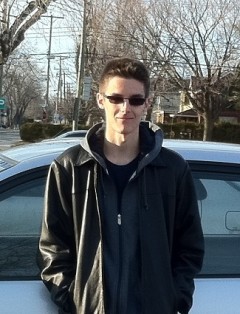Cristian Mincu finished his first year of studies as a Master’s candidate at the Institute of European, Russian, and Eurasian Studies (EURUS) in the spring of 2016. Having previously studied modern Chinese and Russian history, his research interests revolve mainly around the two nations’ respective foreign policies towards one another, embodied by the Sino-Russian strategic partnership. During his first year, he also served as the research assistant for EURUS.
You can also read more about students’ experiences at our Get to Know EURUS page.
One Year at EURUS
By: Cristian Mincu
The past year at the Institute of European, Russian, and Eurasian Studies (EURUS) has been one of my most captivating experiences so far. Coming to Carleton University with a background in history, I was hoping to discover a program that would expand my horizon by allowing me to combine disciplines and to research topics that would have been inaccessible had I chosen to embark on the path to a master’s degree in history. EURUS has permitted me to do just that.
As a student who was interested in studying modern Russo-Chinese relations, I was glad to discover that such a possibility existed at EURUS. Although the program itself is technically centered on Europe and Russia, various courses and expertise offered by EURUS professors make for a program that is very flexible. For example, I was able to take several courses which complemented my grasp of Russian history with 21st century knowledge, such as Russia’s Regional and Global Ambitions and Post-Soviet States and Societies. At the same time, students have the opportunity to reach beyond the program by taking courses which are deemed relevant for their thesis. In my case, I had the option to take a political economy course which focused primarily on China. EURUS also introduced me to topics which I knew little about: the often-ignored area of Central Asia proved to be not only interesting, but also important for my main area of research. This is precisely the horizon-broadening experience I was hoping for.
Coming from a larger city, I also enjoyed Ottawa’s quieter and more relaxed atmosphere, as well as the more intimate ambience I felt on Carleton’s campus: it is developed nearly to the point of being a small city on its own, and yet it is somewhat isolated from the rest of the city by parks and rivers. The impression of community is felt as much in the program as it is on campus. At EURUS, you are more than a number. Professors stop to chat with students outside the classroom and are glad to answer questions, provide advice, or help in any way they can. Meanwhile, the small size of the program creates an effect of belonging: professors and students all know each other on a first name basis.
Some of my most memorable moments during the past year are derived from my experience as a research assistant for EURUS. Through this position, I had the opportunity to help prepare and to attend a variety of interesting lectures and conferences. These have featured speeches from ambassadors, and thought-provoking lectures from scholars, many of whom were born and raised outside of Canada, equipping them with new perspectives which they shared with the audience. Moreover, through the applied internship course offered by EURUS, I became an intern for the Embassy of Romania in Ottawa, where I experienced what the diplomatic world has to offer firsthand. This included attending and taking notes at interesting events such as the monthly European Union delegation meetings in Ottawa, as well as providing weekly news briefs for the second secretary to the Romanian Ambassador to Canada. Both the research assistantship and the internship I have obtained at EURUS have been very valuable in providing me with skills appreciated by employers in today’s world. These include adaptability, analytical expertise, improved communication, organization, and even some project management skills.
As much as I enjoyed the program, it was very taxing at times. Between a full course load, learning a new language, a research assistantship, an internship, and various school-related experiences in between, I sometimes had little energy or time to spare for non-academic activities. That being said, it is worth taking the time to reflect on how much I have accomplished at EURUS during the past eight months: I have broadened my understanding of several topics, befriended stimulating colleagues, acquired new skills that are relevant for today’s world, explored potential career paths, and am well on my way to learning a new language… And I’m only halfway through. Taking all of this into account, my experience at EURUS has so far been very rewarding, and I am very much looking forward to coming back in the fall!